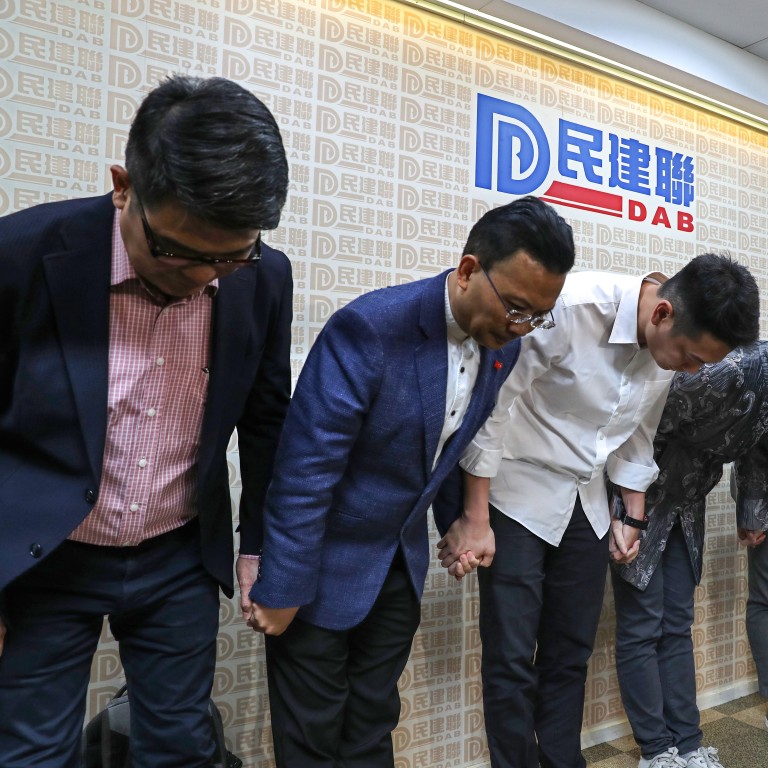
Hong Kong elections: pro-Beijing collapse shows identity politics more important than community issues for district council success, analysts say
- Emphatic rejection of pro-establishment candidates in swathes of Hong Kong also pours cold water on idea that silent majority supports them on radical protests, experts say
The collapse of the pro-Beijing vote revealed identity politics had overtaken community issues as a deciding factor in winning district council seats, analysts said on Monday, as they cast doubt on the existence of a so-called silent majority in support of the establishment.
The anti-government anger boiling up over nearly six months of protests made its mark in polling stations across Hong Kong on Sunday, when voters turned out in their droves to back the pan-democrats over their pro-establishment rivals.
By noon on Monday, the pro-democracy camp seized 17 out of 18 district councils, taking more than 340 of the 452 seats. All councils were previously under pro-establishment control after its candidates dominated the 2015 elections.
Islands district – which has 10 elected seats and eight given automatically to pro-establishment rural chiefs – was the only one held by the pro-Beijing camp.
In the past, Hong Kong voters generally elected their Legislative Council representatives based on their views on the city’s relationship with Beijing, while district council candidates were typically assessed on what they offered to the local community, such as the provision of leisure and welfare services.
City University political scientist Dr Edmund Cheng Wai said the results showed that district-level work was no longer the most important factor.
“A lot of young candidates with little experience in district work won seats. As some experienced district councillors were re-elected with a bigger margin, we can say that district work is now a moderating factor. The most important is your political stance,” he said.
Will election win make pan-democrats the kingmakers of next Hong Kong leader?
The academic also added it would be challenging for newly elected district councillors to deliver on their promises and strengthen their local support, because he said government officials had shown some extra reluctance in cooperating with pro-democracy councillors.

In the run-up to the district council elections, pro-establishment politicians have strongly condemned radical protesters for seriously disrupting the city by blocking key arteries such as the Tolo Highway and the Cross-Harbour Tunnel, and using violent means such as vandalising train stations and throwing petrol bombs to advance their cause.
While some pro-Beijing lawmakers called for the “silent majority” in Hong Kong to vote for pro-establishment candidates, to register their disapproval of violence and chaos, some in the camp still believed community issues would play a significant part.
Political scientist Dr Samson Yuen Wai-hei, of Lingnan University, said the election results suggested the notion a large section of the electorate were hidden supporters of the pro-establishment was “wishful thinking”.
“The pan-democratic camp said this election would be a referendum on protesters’ demands, and it worked, but the pro-establishment, as a camp, did not call it a referendum,” Yuen said.
“In the end, the pro-establishment camp’s supporters, which accounted for about 40 per cent of the electorate, came out to vote, but we didn’t see what they described as a silent majority.”
Hong Kong elections: pro-Beijing camp left reeling from landslide defeat
Yuen believed that with the landslide defeat, the straining ties between the pro-establishment camp and the city’s embattled leader Carrie Lam Cheng Yuet-ngor would further decline.
Yuen said the city’s current electoral system had helped the pro-establishment camp dominate the legislature without adequately reflecting public opinion.
“We need a healthier political system to fix the problems,” Yuen said.
Cheng also said the pro-establishment camp had few options, in the current political system, but to support the government and Beijing.
That meant the election result would not significantly change the camp’s relationship with the government in the long run, he added.

